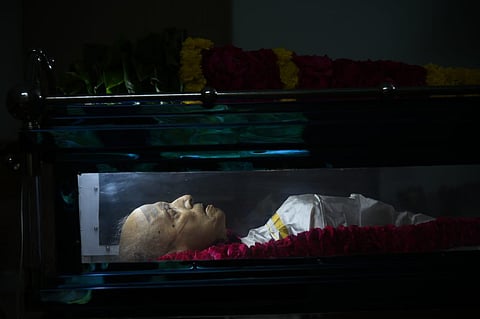

CHENNAI: M S Swaminathan, renowned agricultural scientist and Father of India’s Green Revolution, passed away at 11.20 am at his residence in Chennai on Thursday. He was 98. He was being treated for age-related illness for quite some time. Swaminathan is survived by three daughters, Soumya Swaminathan, Madhura Swaminathan and Nitya Rao. His wife Mina Swaminathan predeceased him.
Condolences poured in from across the country with President Droupadi Murmu and Prime Minister Narendra Modi praising Swaminathan’s service to the nation.
Murmu said Swaminathan left behind a rich legacy, which would serve as a “guiding light to steer the world towards a safer and hunger-free future for humanity”. Modi said his groundbreaking work transformed lives of millions and ensured India’s food security.
Congress president Mallikarjun Kharge, home minister Amit Shah, finance minister Nirmala Sitharaman, Congress leader Rahul Gandhi, Kerala CM Pinarayi Vijayan and several other leaders paid rich tributes to the agricultural icon. Tamil Nadu Chief Minister MK Stalin said his last rites would be held with police honours.
According to family members, Swaminathan’s last rites will be held on Saturday and his mortal remains will be kept for public viewing at the MS Swaminathan Research Foundation (MSSRF) from Friday 8.30am to Saturday 10am.
Born in 1925 in Kumbakonam, Swaminathan earned two undergraduate degrees, including one from the erstwhile agriculture college in Coimbatore, which is now known as Tamil Nadu Agriculture University. He went on to pursue PhD at the Cambridge University in the UK in 1952. He joined the Indian Agricultural Research Institute in 1954 and was its director from 1961 to 1972.
He collaborated with Norman Borlaug, the celebrated American agricultural scientist and 1970 Nobel laureate, in developing high-yielding wheat varieties. He worked along with Chidambaram Subramaniam, agriculture minister in the Lal Bahadur Shastri’s government, and demonstrated how new varieties of seeds would give high yield and help solve India’s foodgrain shortage.
His pioneering research helped India become self-sufficient in food production and ended the need for importing foodgrain. According to the World Food Prize Foundation, wheat production doubled in just a few years, making the country self-sufficient and saving millions from extreme food deprivation.